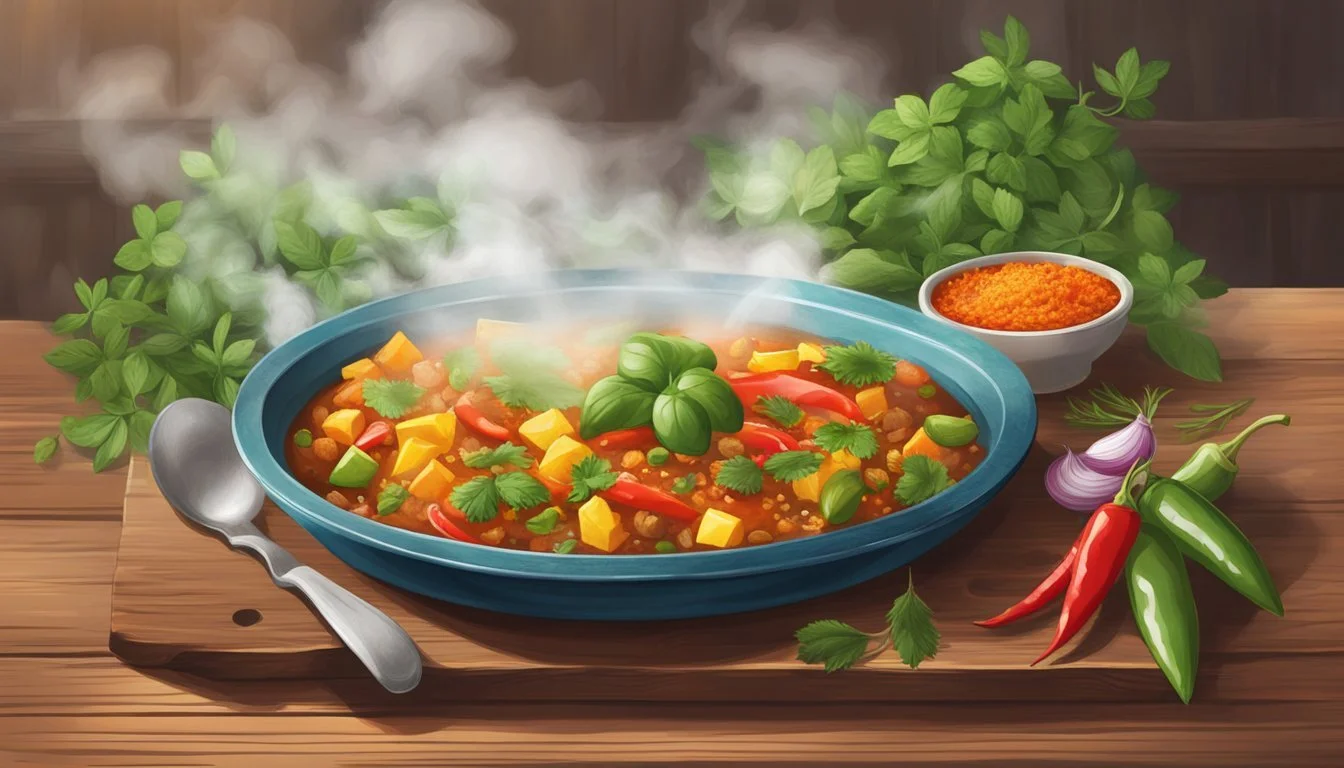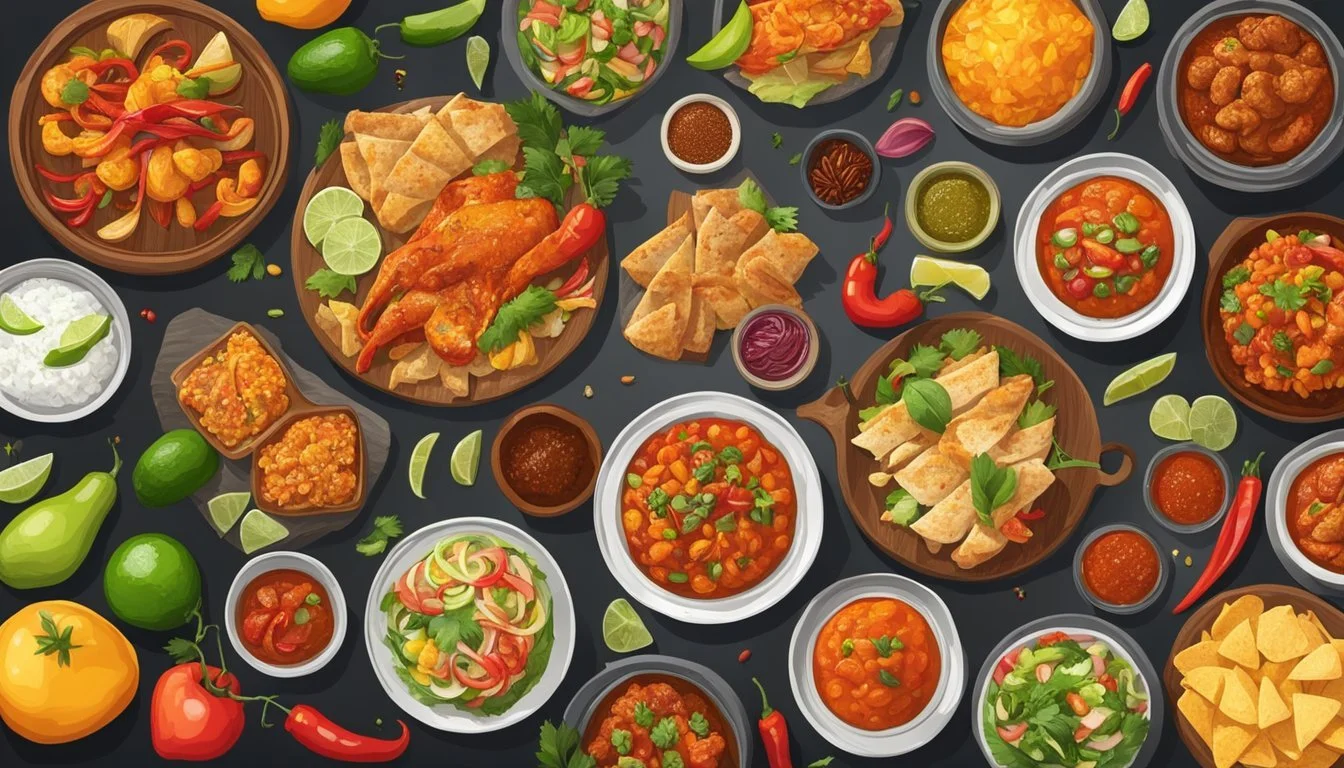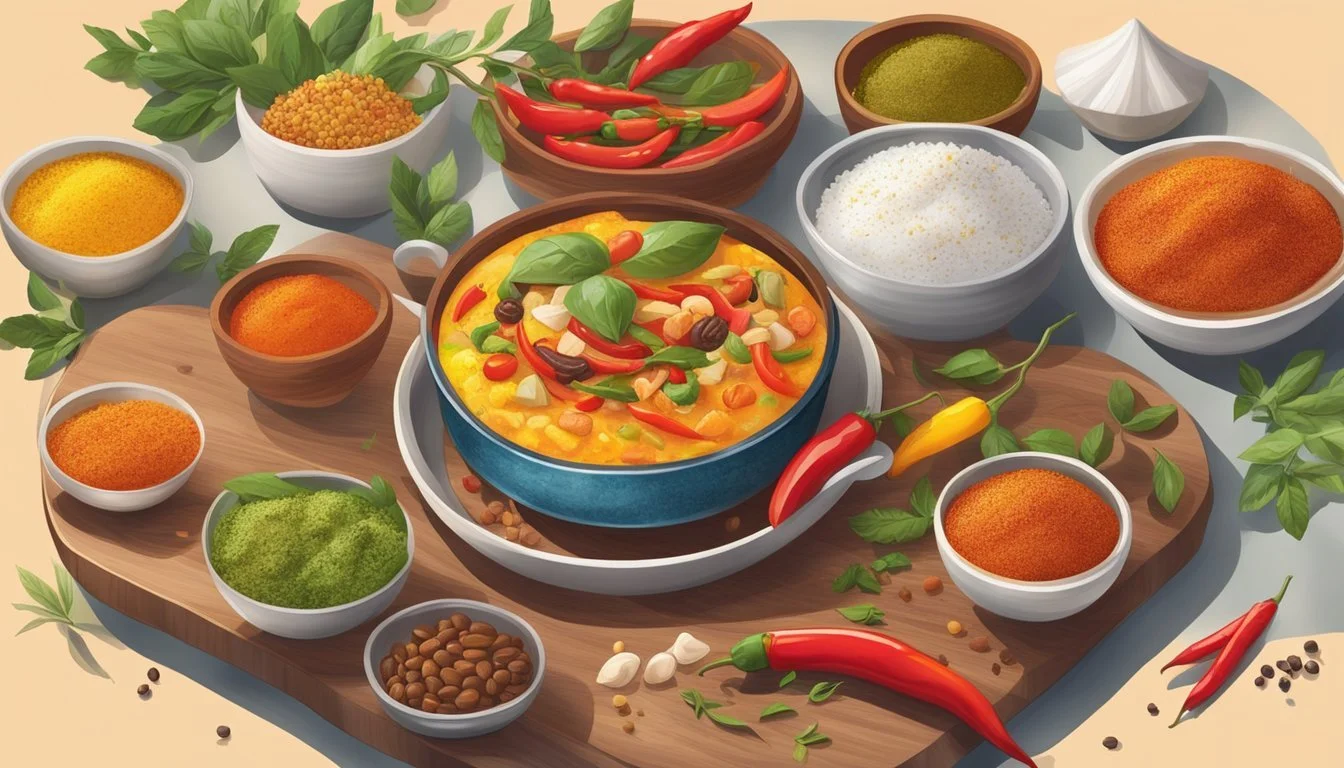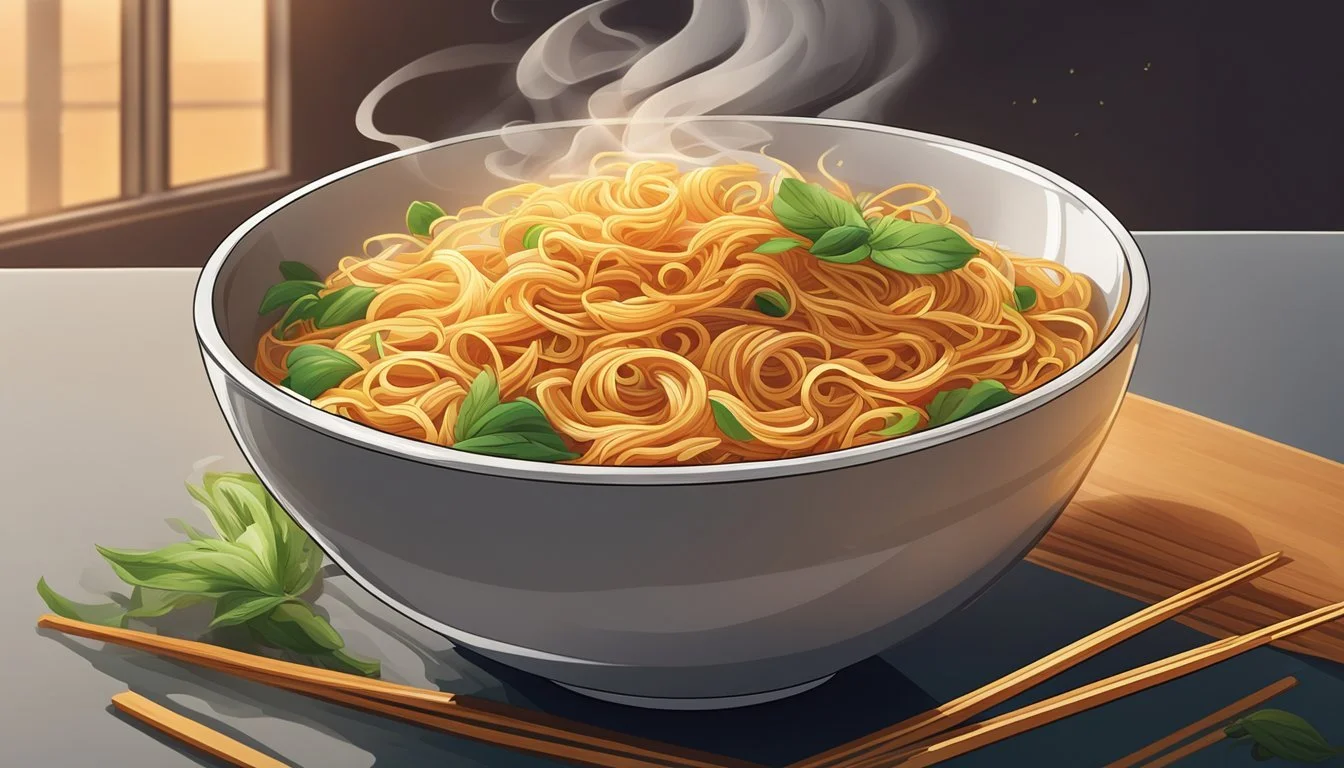Swicy Food Photography
Techniques to Highlight Sweet and Spicy Flavors
The culinary world continuously evolves, introducing novel flavor combinations that tantalize the taste buds. One such trend gaining prominence is 'swicy' food, a term coined to describe dishes that harmoniously blend sweet and spicy elements. This fusion has captured the taste preferences of many, as it offers a complex flavor profile that satisfies a broader sensory palette. Swicy dishes not only make for an exciting dining experience but also present a unique challenge for food photographers who aim to communicate their essence through imagery.
Capturing the essence of swicy dishes requires a meticulous approach to food photography. The interplay of sweetness and heat must be conveyed visually, often prompting photographers to consider elements such as color, texture, and composition more carefully. It is the photographer's task to illustrate the appetizing contrast in a single frame, ensuring that the viewers can almost taste the sweet-spicy combination through the photograph alone.
The popularity of swicy food is underscored by its presence across social media platforms where visually striking images of sweet and spicy pairings garner considerable attention. Photographers are pivotal in showcasing these creations in their most flattering light, leading to compelling images that can drive food trends. The demand for such expertise in food photography signals a recognition of the art form's power to influence culinary preferences and trends within the digital space.
The Evolution of Swicy Flavors
The trend of combining sweet and spicy elements in food has seen a remarkable journey from traditional pairings to its modern-day incarnation in the form of 'Swicy'. This section explores how this flavor profile has evolved and the cultural impact it has sustained.
Origins of Sweet and Spicy
Historically, the combination of sweet and spicy flavors can be traced back to various global cuisines that have long celebrated the complexity such pairings bring to the palate. For instance, Asian and Latin American dishes have regularly utilized honey or fruits with chilies to create harmonious yet exciting flavors. This fusion of tastes has been passed down through generations, signifying both tradition and innovation within culinary practices.
The Portmanteau 'Swicy'
The term 'Swicy', cleverly merging the words "sweet" and "spicy", has recently surged in popularity, in part due to social media platforms like TikTok. It's a portmanteau that has quickly become associated with a food trend that marries the heat of spices with the comforting sweetness of sugar or honey. The influence of TikTok in particular has propelled 'Swicy' foods to new heights, capturing the attention of Gen Z and Millennial food enthusiasts eager for flavor experiences that are both bold and refined.
The Science Behind Sweet and Spicy Pairings
When sweet and spicy elements are combined in food, they create a harmonious balance that not only tantalizes taste buds but also engages a fascinating interplay of biochemistry.
Taste Bud Interaction
Human taste buds can detect five core tastes: sweetness, sourness, saltiness, bitterness, and umami. When consuming sweet and spicy flavors together, the sweetness from sugar is often perceived first, as it directly binds to sweet taste receptors on the tongue. This is swiftly followed by the sensation of spiciness, which is not a taste but a feeling of pain, warmth, or irritation as a reaction to capsaicin.
The Role of Capsaicin
Capsaicin is the active component in chili peppers that imparts the sensation of spiciness. Upon contact with the tongue, capsaicin binds to the TRPV1 receptor, which typically responds to heat and physical abrasion. This interaction tricks the brain into sensing heat where there is none, and as a response, the body may release endorphins, the natural painkillers, creating a mild euphoric sensation.
Sugar and Spice Balance
When sugar and spices containing capsaicin are consumed together, they bring about a balance, as the presence of sugar can mitigate the intensity of the heat felt from capsaicin. This interaction is beneficial in food preparation, allowing the flavors to complement each other without one overshadowing the other.
Sugar's Role:
Masks capsaicin's heat: Reduces the perception of pain by competing with capsaicin for the same nerve endings.
Enhances overall flavor: Allows subtler flavors to emerge by lowering the spice's dominance.
Capsaicin's Role:
Increases complexity: Adds a level of complexity to the food's flavor profile.
Stimulates endorphins: Leads to the release of endorphins that can elevate the eating experience.
Popular Swicy Food Trends
In exploring the dynamic world of swicy flavors, it's evident that the trend extends through various types of cuisine—ranging from sweet confections to savory dishes and inventive drinks. Chefs and food innovators are infusing classic and novel creations with a blend of heat and sugar, resulting in a compelling sensory experience.
Swicy Confections
Chocolate lovers have embraced the swicy trend, with options like chocolate infused with habanero and dusted with spices such as Tajín. Mike’s Hot Honey is also a popular additive, drizzled over sweet treats to enhance their flavor. Merging sweetness with spiciness is not a new concept, yet it's gaining traction in gourmet and everyday confections alike.
Notable Swicy Confections:
Chocolate: Spicy Mexican hot chocolate with cinnamon and chili.
Candies: Mangonada blends sweet mango with spicy chamoy and Tajín.
Savory Swicy Dishes
Restaurants, including Pizza (What wine goes well with pizza?) Hut, feature wings with a hot honey glaze, fusing the sticky sweetness with a touch of heat. Korean cuisine continues to captivate palates with dishes like fried chicken coated in a sweet-spicy sauce, using ingredients like brown sugar and Korean hot sauce. These dishes are celebrated for their ability to balance flavor profiles, satisfying a craving for complexity.
Savory Swicy Examples:
Pizza Hut: Swicy hot honey on wings and pizzas.
Korean Cuisine: Fried chicken with sweet-spicy sauces.
Swicy Beverages
On the beverage front, cocktails and non-alcoholic drinks alike are seeing the inclusion of swicy elements. Margaritas with a hot sauce kick, sweetened with agave syrup, or cocktails featuring spicy syrups from brands like Torani or Monin are trending. Hot honey is increasingly a choice for drink sweetening, illustrating that the swicy trend seamlessly crosses from the plate to the glass.
Intriguing Swicy Beverages:
Cocktails: Margaritas with a habanero or hot sauce twang.
Sodas: Artisan sodas with swicy syrups, catering to a desire for novel beverages.
By extracting the intricate flavors through photography, each dish and drink tells the story of a culinary landscape eager to push boundaries and offer new taste experiences.
Swicy in the Dining Scene
The term "swicy," a portmanteau of sweet and spicy, encompasses a flavor profile that has rapidly gained popularity across various dining experiences.
Restaurants Embracing Swicy
An increasing number of sit-down restaurants have incorporated swicy elements into their menus. For instance, Outback Steakhouse has experimented with swicy sauces, using honey or brown sugar to reduce the heat of chili peppers, thereby offering a tantalizing balance to the palate.
Menu Innovations:
Outback Steakhouse: Chili-glazed grilled shrimp (What wine goes well with shrimp?) with honey-butter sauce.
Fast Food Innovations
Fast food chains are also tapping into the trend, creating signature swicy items to attract customers seeking novel flavors. Burger King and Chick-fil-A have added sauces and menu items that infuse a swicy twist to traditional offerings.
New Offerings:
Burger King: Spicy nuggets with a sweet and tangy sauce option.
Chick-fil-A: Swicy glazed chicken sandwich featuring a peach jalapeño glaze.
Pizza chains, like Pizza Hut, aren't left out, as they increasingly offer swicy toppings and drizzles on their pies, combining things like hot honey and spicy sausage to capitalize on the trend.
Spicy Pizza Innovations:
Pizza Hut: Hot honey drizzle over pepperoni pizza for a swicy kick.
Swicy Food Photography Tips
When capturing swicy dishes, one aims to highlight the vibrant interplay of sweetness and heat that defines these culinary creations. The goal is to evoke the sensory experience through imagery.
Capturing the Essence of Sweet-Spicy Dishes
To effectively photograph swicy food, it's essential to focus on elements that convey both the sweetness and spiciness. Close-ups that show texture details, such as the glaze of hot honey or the sprinkle of chili flakes, can emphasize this duality. These details give the viewer a hint of the sensory experience they might expect—visual cues of the sweet heat they are about to taste.
Styling Techniques for Swicy Foods
Composition: Arrange the dish to showcase ingredients that indicate sweetness (like fruit or syrup) alongside those suggesting spice (like peppers or hot sauce).
Garnish: Add a garnish that contrasts with the main colors of the dish to complement the swicy theme.
Props: Use kitchenware that resonates with the cuisine's origin or the story behind the dish.
Lighting and Color Considerations
Lighting: Utilize backlighting to enhance the glossy, reflective properties of sweet elements, which can also accentuate the texture of spicy components.
Color: Leverage color theory by using complementary colors to intensify the visual appeal—warmer colors may enhance the spicy aspect, while cooler tones can suggest sweetness.
By adhering to these tips, photographers can effectively convey the unique characteristics of sweet-spicy foods, (What wine goes well with spicy food?) offering viewers a taste of swicy through their lenses.
Incorporating Swicy Into Home Cooking
Home cooks can explore the harmonious balance of sweetness and spiciness by integrating swicy elements like gochujang and hot honey into their meals. Whether one is new to this flavor profile or seeking to refine their swicy cooking techniques, there are various ways to embrace this popular trend.
Swicy Recipes for Beginners
For those just starting with swicy cooking, simple recipes offer a way to appreciate this flavor combination without being overwhelmed. An easy dish to begin with is Hot Honey Fried Shrimp—a delightful introduction to swicy cuisine. Dredge shrimp in seasoned flour, fry until golden, and toss with a glaze of hot honey mixed with a pinch of chili flakes. This creates a tantalizing balance of sweetness and heat.
Another approachable recipe is Baked Brie with Cowboy Candy—candied jalapeños. Wrap brie in puff pastry, bake until melted and golden, and top with the cowboy candy for a juxtaposition of creamy cheese and sweet-spiced jalapeños.
Here's a quick guide to get started:
Hot Honey Fried Shrimp:
Dredge shrimp in flour and spices
Fry until golden brown
Toss with hot honey and chili flakes
Baked Brie with Cowboy Candy:
Wrap brie in puff pastry
Bake until golden
Top with candied jalapeños
Advanced Swicy Cooking Techniques
For seasoned cooks looking to deepen their swicy expertise, mastering sauces like nuoc cham and innovative drinks like jalapeño margaritas can add complexity to their dishes. Nuoc cham, a Vietnamese sauce, can be used to dress salads or as a dip, blending sweet, spicy, and umami flavors. Experimenting with gochujang—a Korean fermented chili paste—in stews or marinades, such as in the dish tteokbokki, can lend a unique sweet heat to their cuisine.
Crafting jalapeño margaritas involves infusing tequila with jalapeños to create a bold cocktail with a swicy kick. Additionally, incorporating historical flavors like xocolatl, an ancient Aztec chocolate beverage, can introduce a rich, indulgent dimension when prepared with a hint of chili pepper.
Advanced techniques can enhance these dishes:
Nuoc Cham: Combine fish sauce, lime juice, sugar, water, garlic, and chilies for a versatile sauce.
Tteokbokki: Stir-fry rice cakes with gochujang-based sauce for a quintessential Korean snack.
Jalapeño Margaritas: Infuse tequila with jalapeños for several hours, strain, and mix with lime and agave.
By infusing familiar dishes with swicy flavors or venturing into more intricate recipes, home cooks can capture the essence of the sweet-spicy trend in their own kitchens.
The Future of Swicy Flavors
The swicy flavor profile, a fusion of sweet and spicy, has steadily claimed its place in contemporary cuisine and is set to continue its ascent, propelled by innovative culinary applications and a demand led by younger generations.
Market Research Insights
Recent data has underscored a significant uptick in the incorporation of swicy elements on menus, with an observed 38% increase in such pairings. This surge can be attributed to the adventurous palates of millennials and Gen Z, who tend to favor bold and complex flavor combinations. Market research further reveals that hot honey stands out amongst swicy components, with projections indicating its potential to outstrip numerous other culinary flavors in growth.
Predictions for Swicy Trends
Looking ahead, predictions for swicy trends include a continued expansion across various food categories. One particular area of growth is in the condiment sector, where items like hot pepper jelly are being reinvented with a swicy twist. These trends are not passing whims but indicators of a lasting desire for flavors that balance sweetness with a heat that engages and satisfies the taste buds.
Swicy Food Pairings and Combinations
Creating a harmonious swicy (sweet-spicy) dish revolves around the careful selection of components that enhance and balance each other. These pairings often invoke a dance of flavors on the palate, leading to a complex and enjoyable eating experience.
Swicy Pairings in Culinary Arts
In the culinary world, swicy pairings are a dynamic way to add depth to a dish. Sweet elements often include honey, fruits, or even subtle hints of cinnamon, while spicy components might feature an array of chilis, pepper flakes, or freshly ground pepper. A typical swicy combination is a dish with a honey-garlic glaze, where the sweetness of the honey complements the heat from garlic-infused chilis. Another classic pairing might see the use of ginger, whose peppery flavor is balanced with the warm, sweet notes of soy sauce.
Swicy Inspired Condiments
Condiments are the perfect vehicle for swicy flavors due to their versatility in application. Hot honey, a swicy condiment gaining popularity, is a testament to this trend, combining the smooth sweetness of honey with the fiery kick of chilis. Soy sauce, often a base for many Asian-inspired swicy sauces, serves a dual purpose of umami and saltiness when mixed with sweeter ingredients like brown sugar or pineapple juice. Additionally, ginger can be added to pepperoni-based sauces to cut through the richness with its sharpness, pairing wonderfully with the meat's smoky-sweet profile.
Conclusion
Capturing swicy food in photography demands attention to the vibrant contrasts and the play between sweet and spicy elements. The photographer's skill in highlighting the glossy sheen of a sweet glaze against the fiery colors of spicy ingredients can turn a simple dish into a visual feast.
To effectively showcase swicy dishes, professional photographers often employ techniques such as:
Macro shots to capture texture details
Strategic lighting to emphasize gloss and shine
The use of color theory to complement and contrast the dish's palette
While not every dish will photograph the same, remember these key points:
Swicy foods contain a balance that should be reflected visually
The arrangement of elements in the frame should lead the eye and entice the palate
Ultimately, the goal is to produce an image that not only looks delicious but also communicates the unique sensory experience that swicy foods offer. With the right approach, these photographs can be a powerful tool in culinary storytelling, enticing viewers and enhancing the food's appeal.









